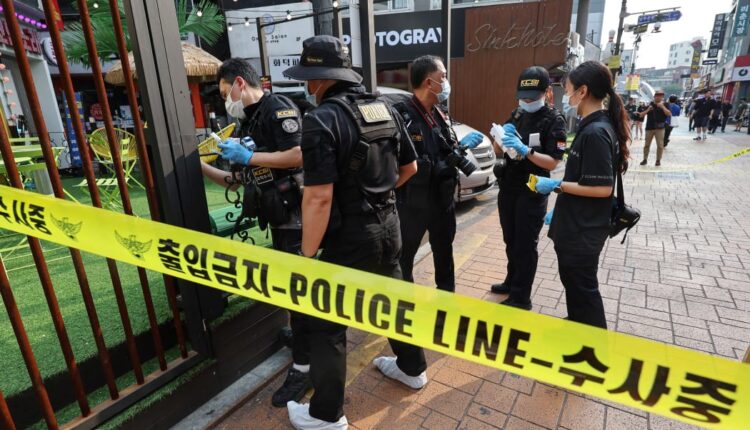A knife darting out in a packed subway car. An assailant, chasing shoppers, stabbing wildly in the street.
These nightmares have played out in the minds of many South Koreans following a mass stabbing attack last week – the country’s second in as many weeks.
On 21 July, a man attacked commuters in the capital, killing one person and stabbing three more at a subway station. He later told police he lived a miserable life and “wanted to make others miserable too”.
Then, on 3 August, 14 people were injured in Seongnam, south-east of Seoul, when a man rammed his car into pedestrians near a subway stop, and then ran into a department store, where he stabbed nine people. One woman died later from her injuries.
The second attacker, Choi Won-jong, 22, was a delivery driver and high-school dropout who had been diagnosed with schizoid personality disorder. Police said he had googled news about the first attack before his own rampage.
“What’s happening in South Korea these days?” cried citizens online afterwards – dazed by back-to-back stabbings in a nation known otherwise for low rates of violent crime.
“Our country used to be one of the safest in the world… but recently I can’t say that any more,” one commented on YouTube.
‘Mudjima’ crimes
In South Korea, they are known as “Don’t Ask Why” or Mudjima crimes – inexplicable acts of violence targeting strangers, driven by no personal link to victims or obvious motive.
While they’ve been called Mudjima by the public for years, it was only in 2022 that South Korean police officially designated such crimes as a distinct category: “Abnormal Motive Crimes”.
With specific definitions and a task force set up to combat them, the move appeared to show authorities finally taking the crimes seriously. In the first half of this year, police recorded 18 Mudjima acts.
While overall data shows no rise in violent crime – South Korea last year in fact recorded its lowest rates in a decade – the recent stabbings have driven the perception that Mudjima acts are more common, and society more dangerous.
It has even led to some commentators making comparisons with the US, with online remarks: “It’s the American mentality that’s going viral in South Korea” and “OMG South Korea has become the USA of Asia”.
Experts reiterate, however, that South Korea remains a very safe country. “Murder and other violent crime rates are very low compared to other countries, and they have been steadily declining in the last 10 years,” said Prof Hyojong Song, a criminology expert at Korea University in Seoul.
South Korea’s homicide rate – down to 1.3 murders per 100,000 people – is half the average of OECD nations, and less than a fifth of America’s murder rate. And there are strict gun controls.
Many online said the crude comparisons to the US mask what authorities need to do locally: “They need to take a look at South Korea’s own social issues that have led to this,” one user wrote.
While the details surrounding the perpetrators are still sketchy, the little revealed so far has already fuelled public anger.
“These days there are jobless losers who are taking their ills out on everybody else,” one user wrote on Tiktok, in a vein of commentary which has become common online.
Source: BBC


Comments are closed.